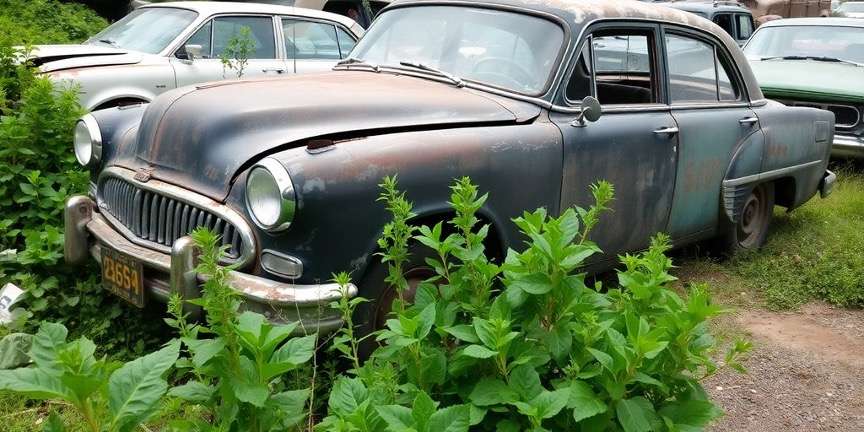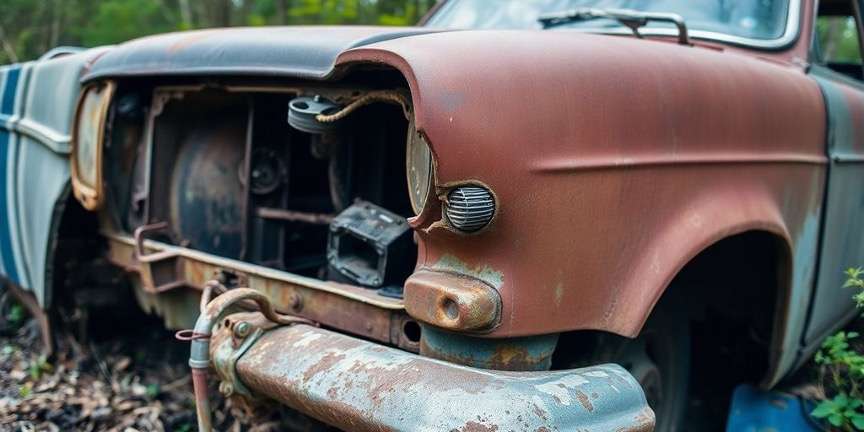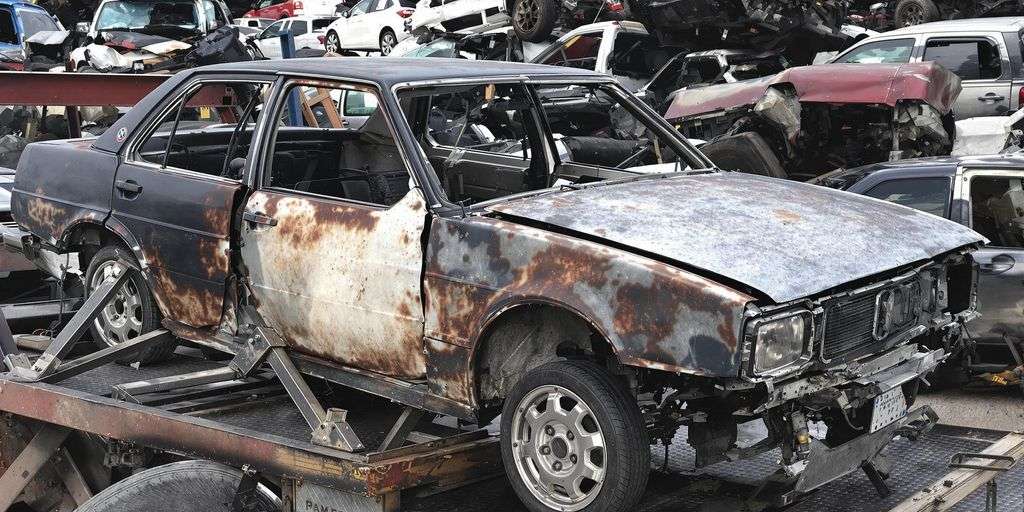Key Takeaways
- Understand what factors affect your junk car's value before selling.
- Prepare your car with necessary paperwork and a good clean-up.
- Choose between local scrap yards and online buyers based on your needs.
- Negotiate wisely and finalize the sale with all paperwork in order.
- Recognize the environmental benefits of recycling your junk car.
Understanding the Value of Your Junk Car
Factors Influencing Junk Car Value
When it comes to figuring out what your junk car is worth, there are a few things to think about. The make and model of your car can play a big role—some brands are just more sought after. Then there's the age; newer cars might fetch a bit more, but if you’ve got a classic, that could be a different story. Condition matters too. If your car still runs or has parts that can be reused, that's a plus. And don't forget about the weight of the metal. Heavier cars, like trucks, might get you more cash because they have more scrap metal to offer.
Using Online Valuation Tools
These days, you don't have to guess your car's value. There are plenty of online tools that can give you a rough estimate. Just punch in some details about your car, and you'll get an idea of what it might be worth. It's a good starting point before you start talking to buyers. Plus, it helps you set expectations so you don't get lowballed.
Setting Realistic Price Expectations
It's easy to get carried away thinking your car is worth a fortune, but setting realistic expectations is key. Consider the factors we talked about—make, model, condition, and weight. Also, take a look at the current market for scrap metal. Prices can go up and down, and timing your sale can make a difference. Remember, what you're really selling is the scrap and parts, not the memories tied to your old ride.
Before you sell, take a moment to understand what your junk car is truly worth. It's not just about getting rid of it, but getting a fair deal for what you have.
Preparing Your Junk Car for Sale
Gathering Necessary Paperwork
Before you even think about selling your junk car, make sure all your paperwork is in order. The car title is the most important document. If you've misplaced it, don't worry, just contact your local DMV to get a duplicate. Besides the title, gather any service records or repair receipts. These documents can help tell the history of your car and might even bump up its perceived value. Also, remember to cancel the registration to avoid any future liabilities.
Cleaning and Organizing the Vehicle
It might sound strange to clean a junk car, but a bit of tidying up can make a big difference. Start by removing all personal items and trash that might have accumulated over the years. Give the car a simple wash and vacuum the interior. A clean car not only looks better but might also fetch a better price. If possible, organize any aftermarket parts you might have installed, as these could add value.
Removing Personal Belongings
Cars have a way of collecting stuff over time. Before handing over your vehicle, check under the seats, in the trunk, and all those little compartments for forgotten items. Don't forget to remove any personal paperwork or documents that might still be in the glove box. It's all about making sure you're not leaving anything behind that you might miss later.
Taking the time to prepare your junk car before selling can smooth out the process and might even help you get a better deal. It's not just about handing over the keys; it's about making sure everything's set for a hassle-free sale.
Choosing the Right Buyer for Your Junk Car
Local Scrap Yards vs. Online Buyers
When it comes to selling your junk car, choosing the right buyer can make all the difference. Local scrap yards are often the go-to for many sellers. They offer quick and straightforward transactions, but be aware that they might not always provide the highest price. On the other hand, online platforms like Peddle, Carvana, and Copart can sometimes offer more competitive pricing. These platforms are convenient but can take a bit longer to complete the sale.
Evaluating Buyer Reputation
Before finalizing any deal, it's important to evaluate the reputation of potential buyers. Start by checking online reviews and asking for recommendations from friends or family who have sold junk cars before. Look out for any red flags, such as buyers who pressure you into quick decisions or those offering prices that seem too good to be true. Trustworthy buyers will communicate clearly and provide transparent terms.
Understanding Buyer Offers
When you receive offers, don't just focus on the price. Consider additional benefits like free towing or quick payment options. Gather multiple offers to compare and remember, the highest offer isn't always the best choice if it lacks convenience or reliability. Be ready to negotiate and present any relevant information about your car, such as maintenance records, to support your case. A reliable buyer will be open to discussions and willing to reach a mutually agreeable price.
Selling a junk car is more than just about getting rid of an old vehicle; it's about finding the right partner who values your car as much as you do. Take your time to explore your options and make a decision that balances both price and peace of mind.
The Selling Process: From Negotiation to Final Sale
Getting a Quote and Accepting Offers
So, you've decided to sell your junk car. First things first, get a quote. This usually starts with a quick assessment, which might involve filling out online forms or having someone inspect the car in person. Once you have a quote, it's time to negotiate. Don't just jump at the first offer—shop around a bit. Understanding the market can help you get a fair price.
Scheduling Pickup or Dropoff
Once you've agreed on a price, the next step is figuring out how to get the car to the buyer. Depending on the service you choose, you might need to drop off the car at their location, or they might come to pick it up. Some places charge for towing, while others offer it for free. Make sure to understand the requirements and processes involved to ensure a smooth transaction.
Finalizing the Sale and Paperwork
Finally, it's time to wrap things up. Get everything in writing. This includes the sale price, any terms like pick-up dates or towing services, and the payment method. Make sure you're comfortable with how you'll get paid before handing over the keys. Don't forget to transfer the car title properly to avoid future liabilities. This step is crucial for ensuring you're no longer responsible for the vehicle after the sale.
Environmental and Financial Benefits of Selling a Junk Car

Recycling and Environmental Impact
Selling a junk car isn't just about getting rid of an old vehicle; it's about contributing to a healthier planet. When you sell your car to a reputable buyer, they often dismantle it for parts. This means engines, transmissions, and other components can be refurbished and reused, reducing the need for new manufacturing. Recycling reduces waste and keeps harmful materials, like battery acids, out of landfills. Plus, metal from your car is melted and repurposed, cutting down on the need for mining. This process not only conserves energy but also slashes pollution.
Financial Incentives and Tax Benefits
Transforming your junk car into cash is a straightforward way to gain financial benefits. Many scrap yards and auto recyclers offer cash payments for the metal and parts they can salvage. This means you can earn money while also doing something good for the environment. Additionally, if you donate your car to certain organizations, you might qualify for tax deductions. However, be sure to consult with a tax professional to understand the specifics.
Reducing Waste and Pollution
By selling your junk car, you're taking a stand against waste. Cars that sit idle can leak fluids and other harmful substances into the ground, polluting the soil and water. Recycling your vehicle helps prevent this. Moreover, it ensures that usable parts are not wasted but instead find new life in other vehicles. This reduces the overall demand for new parts, which further diminishes the environmental footprint of car manufacturing.
Selling your junk car is a win-win situation. You clear your space, earn some cash, and contribute to a more sustainable environment. It's a simple yet effective way to make a positive impact.
Avoiding Common Pitfalls in the Junk Car Selling Process

Avoiding Lowball Offers
When you're ready to sell your junk car, it's easy to jump at the first offer that comes your way. But patience is key. Take time to shop around and get multiple quotes. This way, you can get a feel for the market value of your car and avoid settling for less than it's worth. Consider using online platforms to compare offers quickly. Remember, a little research can go a long way in maximizing your car's value.
Ensuring Buyer Legitimacy
In the world of junk car sales, not all buyers are trustworthy. It's essential to verify that the buyer is legitimate before proceeding with the sale. Check for necessary licenses and insurance to avoid legal trouble. Look for reviews or testimonials from previous sellers to gauge the buyer's reputation. A reputable buyer will have no problem providing clear and transparent terms. Discover essential questions to ask before selling a junk car to ensure a smooth transaction.
Being Honest About Car Condition
Transparency about your car's condition is crucial. Be upfront about any issues or damages your vehicle has. This honesty helps build trust with the buyer and prevents future disputes. It's better to disclose everything from the start than to face potential conflicts later. Plus, being honest can sometimes lead to better offers, as buyers appreciate transparency.
Conclusion
So, there you have it. Selling your junk car is more than just a transaction; it's a journey. From figuring out its worth to deciding whether to sell it whole or in parts, each step has its own quirks. Maybe you found a local scrapyard that offered a decent price, or perhaps you went the online route for a bit more cash. Either way, you've turned an old clunker into something useful again. Plus, you've done your bit for the environment by recycling. It's not just about the money—it's about making the most of what you've got. So next time you see that rusty old car in your driveway, remember, it's not just junk; it's a chance to make a difference.
Frequently Asked Questions
What steps should I take before selling my junk car?
First, gather all important papers like the car title. Clean out your car and remove any personal items. Then, check out different buyers to find the best deal.
How do I know how much my junk car is worth?
The value depends on things like the car's make, model, and condition. You can use online tools to get an idea of how much it's worth.
What are the benefits of selling my junk car?
Selling your junk car can give you some extra cash. It also helps the environment since many parts can be reused or recycled.
Can I sell my junk car without a title?
It’s harder to sell a car without a title, but some places might still buy it. Check with local scrapyards or buyers to see if they have options for you.
How do I avoid scams when selling my junk car?
To avoid scams, research buyers before making a deal. Make sure they have a good reputation and read reviews from other sellers.
What happens after I sell my junk car?
After you sell your car, the buyer might take it apart for parts or recycle it. This helps reduce waste and can be good for the planet.



